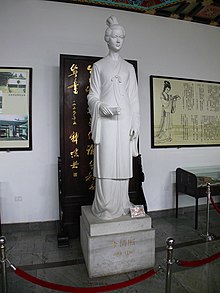Analysis of Tz'u No. 17 (He Is Gone)
Li Ching Chao 1804 (Jinan, Shandong) – 1155 (Shaoxing, Zhejiang)
To the tune of "Wu Ling Spring"
Wind ceased, the dust is scented
with the fallen flowers.
Though day is getting late, I am too weary
to attend to my hair.
Things remain as ever, yet he is here no more,
and all is finished.
Fain would I speak, but tears flow first.
They say that at the Twin Brooks
spring is still fair.
I, too, wish to row a boat there.
But I am afraid that the little skiff
on the Twin Brooks
Could not bear the heavy load of my grief.
| Scheme | X XXXAXXX BAAXBX |
|---|---|
| Poetic Form | |
| Metre | 1011111 1101110 101010 11110111110 101111 101110111111 01110 11111111 1111011 1111 11111011 1110110101 1011 1110101111 |
| Closest metre | Iambic tetrameter |
| Characters | 458 |
| Words | 95 |
| Sentences | 8 |
| Stanzas | 3 |
| Stanza Lengths | 1, 7, 6 |
| Lines Amount | 14 |
| Letters per line (avg) | 25 |
| Words per line (avg) | 7 |
| Letters per stanza (avg) | 115 |
| Words per stanza (avg) | 31 |
Font size:
Submitted on May 13, 2011
Modified on March 05, 2023
- 28 sec read
- 24 Views
Citation
Use the citation below to add this poem analysis to your bibliography:
Style:MLAChicagoAPA
"Tz'u No. 17 (He Is Gone)" Poetry.com. STANDS4 LLC, 2024. Web. 27 Apr. 2024. <https://www.poetry.com/poem-analysis/25834/tz%27u-no.-17-%28he-is-gone%29>.


Discuss this Li Ching Chao poem analysis with the community:
Report Comment
We're doing our best to make sure our content is useful, accurate and safe.
If by any chance you spot an inappropriate comment while navigating through our website please use this form to let us know, and we'll take care of it shortly.
Attachment
You need to be logged in to favorite.
Log In